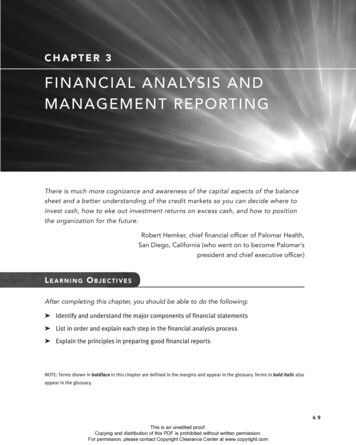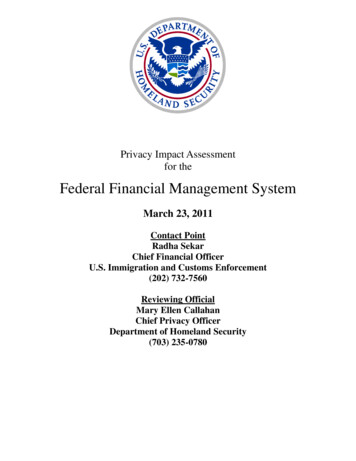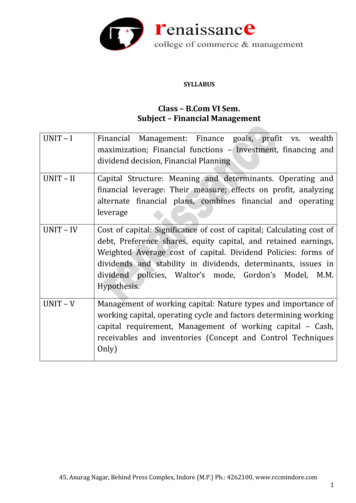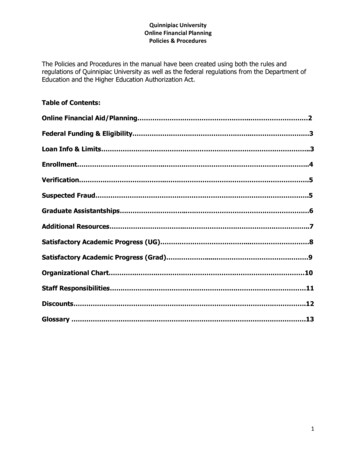
Transcription
INTRODUCTION TOFINANCIAL MANAGEMENTUNIT-1
MEANING OF FINANCIAL MANAGEMENT Finance may be defined as the art and science of managing money. It includes financial service and financial instruments. Finance function is the procurement of funds and their effective utilizationin business concerns.
DEFINITION OF FINANCIAL MANAGEMENT Theterm financial management has been defined by Solomon, “It isconcerned with the efficient use of an important economic resourcenamely, capital funds”. The most popular and acceptable definition offinancial management as given by S.C. Kuchal is that “FinancialManagement deals with procurement of funds and their effectiveutilization in the business”.
Weston and Brigham : Financial management “is an area of financialdecision-making, harmonizing individual motives and enterprise goals”.
FINANCIAL MANAGEMENT IS CONCERNEDWITH Financing Decisions Investment Decisions Dividend decisions
SCOPE OF FINANCIAL MANAGEMENT 1. Financial Management and Economics: Economic concepts like microand macroeconomics are directly applied with the financial managementapproaches. Investment decisions, micro and macro environmental factorsare closely associated with the functions of financial manager. 2. Financial Management and Accounting: Accounting records includesthe financial information of the business concern. Hence, we can easilyunderstand the relationship between the financial management andaccounting.
3. Financial Planning 4.Deciding the Capital Structure 5. Selection of source of Finance 6. Selection of pattern of investment.
OBJECTIVES OF FINANCIAL MANAGEMENT 1. Profit maximization 2. Wealth maximization.Profit MaximizationMain aim of any kind of economic activity is earning profit. A business concern isalso functioning mainly for the purpose of earning profit. Profit is the measuringtechniques to understand the business efficiency of the concern.Profit maximization consists of the following important features.1. Profit maximization is also called as cashing per share maximization. It leads tomaximize the business operation for profit maximization.2. Ultimate aim of the business concern is earning profit, hence, it considers all thepossible ways to increase the profitability of the concern.
Wealth Maximization Wealthmaximization is one of the modern approaches, which involveslatest innovations and improvements in the field of the business concern.The term wealth means shareholder wealth or the wealth of the personsthose who are involved in the business concern. Wealth maximization isalso known as value maximization or net present worth maximization.This objective is an universally accepted concept in the field of business.
FUNCTIONS OF FINANCE MANAGER 1. Forecasting Financial Requirements It is the primary function of the Finance Manager.He is responsible toestimate the financial requirement of the business concern. He shouldestimate, how much finances required to acquire fixed assets and forecastthe amount needed to meet the working capital requirements in future. 2. Acquiring Necessary Capital After deciding the financial requirement,the finance manager shouldconcentrate how the finance is mobilized and where it will be available. It isalso highly critical in nature.
3. Investment Decision The finance manager must carefully select best investment alternatives andconsider the reasonable and stable return from the investment. 4. Cash Management Present days cash management plays a major role in the area of financebecause proper cash management is not only essential for effectiveutilization of cash but it also helps to meet the short-term liquidity positionof the concern. 5. Interrelation with Other Departments Finance manager deals with various functional departments such asmarketing, production, personnel, system, research, development, etc.
IMPORTANCE OF FINANCIAL MANAGEMENT Financial Planning Financial management helps to determine the financial requirement of thebusiness concern and leads to take financial planning of the concern.Financial planning is an important part of the business concern, which helpsto promotion of an enterprise. Acquisition of Funds Financial management involves the acquisition of required finance to thebusiness concern. Acquiring needed funds play a major part of the financialmanagement, which involve possible source of finance at minimum cost.
Proper Use of FundsProper use and allocation of funds leads to improve the operational efficiency ofthe business concern. When the finance manager uses the funds properly, they canreduce the cost of capital and increase the value of the firm.Financial DecisionFinancial management helps to take sound financial decision in the businessconcern. Financial decision will affect the entire business operation of the concern.
Improve Profitability Profitability of the concern purely depends on the effectiveness and properutilization of funds by the business concern. Increase the Value of the Firm Financial management is very important in the field of increasing thewealth of the investors and the business concern. Ultimate aim of anybusiness concern will achieve the maximum profit and higher profitabilityleads to maximize the wealth of the investors as well as the nation. Promoting Savings Savings are possible only when the business concern earns higherprofitability and maximizing wealth.
The chief financial officer often distributes the financial management responsibilitiesbetween the controller and the treasurer. The controller normally has responsibility for allaccounting-related activities. These include such functions as:Financial Accounting This function involves the preparation of the financial statements forthe firm, such as the balance sheet, income statement, and the statement of cash flows.Cost Accounting This department often has responsibility for preparing the firm’soperating budgets and monitoring the performance of the departments and divisionswithin the firm.
Taxes This unit prepares the reports that the company must file with the variousgovernment (local, state, and federal) agencies.Data Processing Given its responsibilities involving corporate accounting and payrollactivities, the controller may also have management responsibility for the company’s data processing operations.The treasurer is normally concerned with the acquisition, custody, and expenditure offunds. These duties often include:Cash and Marketable Securities Management This group monitors the firm’s short -termfinances forecasting its cash needs, obtaining funds from bankers and other sources whenneeded, and investing any excess funds in short-term interest -earning securities.
Capital Budgeting Analysis This department is responsible for analyzingcapital expenditures that is, the purchase of long -term assets, such as newfacilities and equipment. FinancialPlanning This department is responsible for analyzing thealternative sources of long-term funds, such as the issuance of bonds orcommon stock, that the firm will need to maintain and expand itsoperations.
Credit Analysis Most companies have a department that is responsible fordetermining the amount of credit that the firm will extend to each of itscustomers. Although this group is responsible for performing financialanalysis, it may sometimes be located in the marketing area of the firmbecause of its close relationship to sales. InvestorRelations Many large companies have a unit responsible forworking with institutional investors (for example, mutual funds), bondrating agencies, stockholders, and the general financial community.
Pension Fund Management The treasurer may also have responsibility forthe investment of employee pension fund contributions. The investmentanalysis and portfolio management functions may be performed eitherwithin the firm or through outside investment advisors. It should be emphasized that the specific functions of the controller andtreasurer shown in Figure are illustrative only and that the actual functionsperformed vary from company to company. For example, in somecompanies, the treasurer may have responsibility for tax matters. Also,the board of directors of the company may establish a financecommittee, consisting of a number of directors and officers of the firmwith substantial financial expertise, to make recommendations on broadfinancial policy issues.
Financial Planning Financial management helps to determine the financial requirement of the business concern and leads to take financial planning of the concern. Financial planning is an important part of the business concern, which helps to promotion of an enterprise. Acquisition of Funds










